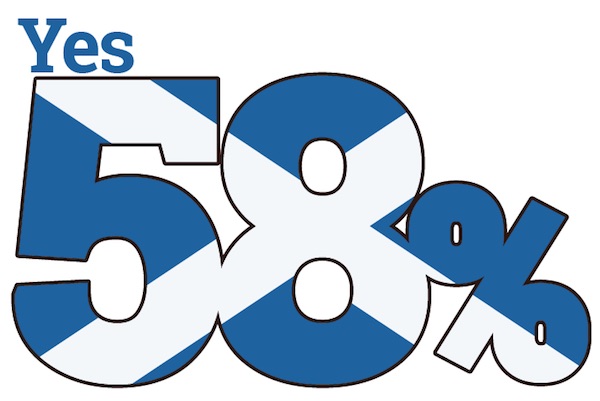
Post-Brexit Europe will see a border between Scotland and England if the result of the latest poll, which found 58% of Scots now support independence, is borne out in a referendum.
It is the highest ever result in favour of independence by the respected Scottish Political Monitor polls. The result was confirmed by another poll by Survation, which showed 75% of Scots would back independence if they’re convinced that it will benefit the economy.
Independence is now “the settled will of the majority” in Scotland, according to the the Scottish National Party (SNP).
“Faced with the chaotic and incompetent government of Boris Johnson and a Westminster system which treats Scotland as an afterthought at best, more and more people are deciding that the best way forward for Scotland is as an equal, independent country,” said the party’s deputy leader, Keith Brown.
Nationalists in the Edinburgh parliament also look certain to win a majority in elections next May, according to the poll, and some 64% also agreed that a new independence referendum should be held within the next five years.
However, responding to the new polls, the Tory government in London once again renewed its opposition to a second independence referendum for Scotland. It said a previous referendum six years ago, when 45% of voters supported independence, “was a once in a generation vote and it must be respected”.
But Brown said if there is a clear majority for pro-independence, pro-referendum parties in next year’s election, then “no Tory or any UK Government has the right to stand in the way”.
“Quite simply, in those circumstances, the Tories would lack any moral or democratic authority whatsoever to try and block the will of the people, and it would not stand,” he said.
“Already, the Westminster wall of opposition to a referendum has started to crumble, with private acknowledgement that a result like this in next year’s election would have to lead to a referendum, and this poll will only solidify that growing view.”
In the event of a break-up of the union between Scotland and England, there are question marks over the future orientation of unionists in the north of Ireland. Those questions become more difficult in the event of a hard Brexit, with Britain set to drop out of the EU without a trade deal and Scotland likely to secure a rapid return.
Unionists in Ireland are keen to emphasis their connection to Scotland and the Ulster-Scots dialect, but public opinion among their perceived kin is swiftly turning against London. With no indication that the London government will allow a referendum on Irish reunification to go ahead, the north of Ireland could soon find itself bracketed by two hard borders and without an agreement to trade across either.
The escape route of Irish unification still seems far away, with the coalition government in Dublin continuing to rebuff pressure to prepare for unity. It is instead urging co-operation and ‘better relations’ with unionists at Stormont.
On Tuesday, the 26 County Minister for Public Expenditure Michael McGrath announced that €100 million would be set aside per year in funding for a so-called ‘Shared Island’ initiative.
A note from officials said the money would be allocated to government departments and agencies to fund a variety of cross-Border projects, such as the A5 road, cross-Border cycle paths, a canal connection on Lough Erne, a bridge at Carlingford Lough, and “an all-island research hub”.
The funding came as part of a budget dominated by plans for a hard Brexit and the coronavirus, but with no plan for tackling constitutional issues.
![[Irish Republican News]](https://republican-news.org/graphics/title_gifs/rn.gif)
![[Irish Republican News]](https://republican-news.org/graphics/title_gifs/harp.gif)

